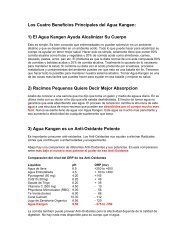ACID-ALKALINE BALANCE: ROLE IN CHRONIC ... - My Kangen Tools
ACID-ALKALINE BALANCE: ROLE IN CHRONIC ... - My Kangen Tools
ACID-ALKALINE BALANCE: ROLE IN CHRONIC ... - My Kangen Tools
You also want an ePaper? Increase the reach of your titles
YUMPU automatically turns print PDFs into web optimized ePapers that Google loves.
Kidney International, Vol. 58 (2000), pp. 1859–1869<br />
Citrate therapy for polycystic kidney disease in rats<br />
GEORGE A. TANNER and JUDITH A. TANNER<br />
Department of Physiology and Biophysics, Indiana University School of Medicine, Indianapolis, Indiana, USA<br />
autosomal dominant PKD, the Han:SPRD strain, in a<br />
laboratory animal-breeding facility in Hanover, Germany<br />
[2]. Homozygous animals with altered PKD genes<br />
develop massively enlarged cystic kidneys and die at<br />
about three to four weeks of age. Heterozygous males<br />
and females develop a slowly progressive cystic disease,<br />
which is much more severe in males than in females.<br />
Death from renal failure in male heterozygotes occurs<br />
at a median age of about 6 [2] or 17 months [3] in different<br />
colonies. The heterozygous Han:SPRD rat with PKD<br />
may be a useful model for human autosomal dominant<br />
PKD [2–5], even though the abnormal gene in the rat<br />
[6] may not correspond to the PKD-1 or PKD-2 genes<br />
that are defective in almost all patients with ADPKD.<br />
We recently demonstrated that if heterozygous male<br />
Han:SPRD rats with PKD were provided with a solution<br />
of potassium citrate/citric acid (abbreviated “KCitr”) to<br />
drink, starting at one month of age, then the glomerular<br />
filtration rate (GFR) was sustained at a normal level and<br />
the kidneys showed less cystic disease when the rats were<br />
three months old [7]. By contrast, littermate rats with<br />
PKD that drank tap water had a GFR one half of normal,<br />
large kidney cysts, and extensive renal interstitial disease.<br />
The present study had two purposes: (1) to ascertain<br />
whether the benefits of KCitr therapy would be<br />
sustained beyond three months, and (2) to examine the<br />
mechanism of this beneficial effect.<br />
To assess the effectiveness of KCitr administration<br />
beyond three months of age, we treated Han:SPRD rats<br />
with KCitr for longer times in two sets of experiments.<br />
First, we treated rats, starting at the age of one month,<br />
and measured renal function at six months of age. Sec-<br />
ond, we treated rats from the age of one month until their<br />
deaths to see whether this treatment prolonged survival.<br />
To gain some insight into the mechanism of KCitr<br />
therapy, we examined several parameters. First, we measured<br />
blood and urine pH values to determine whether<br />
KCitr intake affected these variables. Second, we hypothesized<br />
that renal citrate handling might be abnormal<br />
in rats with PKD, based on a previous report that citrate<br />
excretion is abnormally elevated in these rats [8]. We<br />
therefore measured plasma and renal tissue citrate levels<br />
and renal reabsorption and consumption of citrate; the<br />
Citrate therapy for polycystic kidney disease in rats.<br />
Background. Few treatments are available to slow the progression<br />
to renal failure in autosomal dominant polycystic kid-<br />
ney disease (PKD). In an animal model of PKD, the male<br />
heterozygous Han:SPRD rat, intake of a solution of potassium<br />
citrate plus citric acid (KCitr) from age one to three months<br />
prevented a decline in glomerular filtration rate (GFR). The<br />
present study tested whether this beneficial effect is sustained<br />
and explored handling of citrate and ammonia in normal and<br />
cystic kidneys.<br />
Methods. Rats were provided with tap water or citrate solu-<br />
tions to drink, and clearance and survival studies were performed.<br />
Results. The GFRs of rats with PKD that consumed KCitr<br />
from one month of age were normal at six months of age, while<br />
those of their counterparts on water were about one third of<br />
normal. Long-term KCitr treatment extended the average life<br />
span of rats with PKD from 10 to 17 months. Compared with<br />
normal rats, water-drinking rats with PKD had higher plasma<br />
[citrate], renal cortical [citrate], and fractional excretion of<br />
citrate, and lower rates of renal citrate consumption, ammonia<br />
synthesis, and ammonia excretion. Cortical P NH3 was not elevated<br />
in cystic kidneys. Intake of Na 3 citrate/citric acid solution or K 3<br />
citrate solution, but not ammonium citrate/citric acid solution,<br />
prevented a decline in GFR in three-month-old rats with PKD.<br />
Conclusions. Rats<br />
with<br />
PKD show abnormal renal handling<br />
of citrate and ammonia. Citrate salts that have an alkalinizing<br />
effect preserve GFR and<br />
extend survival.<br />
Autosomal dominant polycystic kidney disease<br />
(ADPKD) is an inherited disorder that afflicts more than<br />
500,000 people in the United States alone and millions<br />
more worldwide. This disease is accompanied by the for-<br />
mation and enlargement of numerous fluid-filled epithelial<br />
sacs (cysts) in both kidneys and eventual development<br />
of renal failure. There is currently no specific treatment<br />
to halt or slow the progression of renal failure in patients<br />
with PKD [1].<br />
In 1991, Kaspareit-Rittinghausen, Deerberg, and Wcislo<br />
discovered a mutant strain of Sprague-Dawley rats with<br />
Key words: autosomal dominant polycystic kidney disease, potassium<br />
citrate, sodium citrate, citric acid, renal ammonia, Han:SPRD rat.<br />
Received for publication October 19, 1999<br />
and in revised form May 12, 2000<br />
Accepted for publication May 19, 2000<br />
© 2000 by the International Society of Nephrology<br />
1859



